|
VISIT OUR MASSES and HOMILIES ONLINE! CLICK BELOW TO WATCH
St. Elizabeth of Ravenna Catholic Church
We Have No Lasting City
How short is the length of my days!
Now I know how fleeting my life is.
You have given me a short span of days;
my life is as nothing in your sight.
A mere breath is human life,
a mere shadow passing by... (Psalm 39:4-6)
As we complete the "Season of Creation" and approach the feast of St. Francis of Assisi, patron of the environment, we realize that much of the beauty of creation around us is fleeting. Things pass rapidly and nothing stands still, impressing upon us that what is temporary is worthy of special respect and admiration. Amid our difficult times, we are eager to welcome the changes and all the glory they entail. Plentiful rain in summer has resulted in intense foliage in the woodlands and hillsides, and still it is not lasting as we anticipate the coming frost and the brilliant-colored leaves of autumn soon to follow.
Like our individual lives, creation all around us has a fleeting character: wildlife scurry about, bees seem to be busier, flower color is deeper, cobwebs are thicker, and moving water has a more distinct sound. Even amid change, we still need to pause and reflect for a moment and show gratitude for the sights, sounds, fragrances and vibrations of seasonal conditions: squirrels are restless as winter approaches; birds are flocking as many prepare to move to warmer climates; trees are getting ready for their final glory in leaves changing color; yellow and golden flowers deck the landscape; lakes sparkle through daylight and shimmer sunset; mists rise from rivers on cool mornings; streams exude a fresh gurgling sound; brother sun gives comfort after relentless summer heat; and sister moon with her fullness at harvest time and softness in the night sky; all participate in the changing seasons.
One impulse is to capture the changing scenes, as Peter tried to build some token of permanence at the Transfiguration event. Yes, we could paint a landscape or record a gurgling brook, but to what benefit? Far better is to accept the fleeting nature and find this part of our path through this brief mortal stance. No, it is not permanent, nor are we to expect it to be. The landscape's creatures are telling us something worth pondering: we are here but awhile and should make the best of it. Accept changes as part of the spoken words of a creation whose beauty does not stand still, but adds glory in its movement.
In these times of pandemic and the need to curb climate change, we yearn for a precious pause, which can energize us to continue the work ahead. Changing landscape inspires us to renew what is damaged, and to do it now. We need energy to help foster uplifted spirits, so that we are better prepared to collaborate with global citizens. Yes, we bless all creation in word and deed, not just as spectators, but as participants in a changing world.

Wildflowers of September
Black-eyed Susan.
(*photo
credit)
October 1, 2021 Tolerating Non-Believers. What about Non-Belief?
An unanswered question from September 26th's Reflections: Should we tolerate unbelief? We tolerate people with all sorts of belief systems and lack thereof, provided they do not hurt others by trying to act out these beliefs. However, should we tolerate the ill effects of unbelief? What about those who doubt that our Earth is in trouble and demand equal time to refute or challenge scientific testimony evident to so many? If we allow equal time to the merchants of doubt whose message is deliberately meant to stall regulation and control of misdeeds, then something seems wrong; efforts to make corrective preventive measures will be deferred while high profits go to the status-quo keepers. All the while, Earth herself faces a rapidly approaching tipping point.
Limits to tolerance exist. As stated on September 26 our tolerance is directed to people and their beliefs -- and even their right to lack of belief. People have a right to hold beliefs, provided they do not infringe on the rights of others. However, certain ideas when enacted can affect the planet and its
inhabitants. The "right" to believe and do as one pleases has its limits. Exceeding limits of the public welfare is never tolerated within civilized society, and our jails testify to restricting actions of felons in society when they act with abandon.
In unbelief outside these limits? What about actions of those so-called nihilists? If these folks harbor their mental condition as private comfort for themselves, well we can let that go. We tolerate them even if we do not agree with what they hold. However, what if they decide to bomb a building or threaten believers into submission? Now tolerance suddenly becomes a public security issue, and police and FBI are called to visit the bomb-making cellar of the nihilist. We demand preventive measures.
Is silence proper in the face of unbelief? A case may not involve bomb-making but computer-generated nihilistic propaganda. Certainly, the age of the Inquisition is long past, but limits to tolerance in our own actions must be considered. The Internet is a public place; politically motivated unbelief could lead to intellectual suicide and paralysis. Counter measures may be demanded and tolerating silence is certainly no virtue.
We certainly must tolerate unbelievers and their right to believe, provided they do not intimidate us to remain silent to the harmful effects of their belief. They cannot be permitted to paralyze national or global policy changes for their own benefit. Yes, even if unbelief is uttered by nominal co-religionists, it must be challenged. We must speak out. Unbelievers are wrong to think our silence is demanded when their views can inadvertently oppress us and harm our Earth. Defense must involve direct public confrontation of unbelief when publicized in some fashion.
Prayer: Lord, teach us to know when we must be silent and when we must speak in defense of the greater good.

Philadelphia Fleabane, Erigeron philadelphicus
(*photo
credit)
October 2, 2021 Clashing of Good and Evil
Climate change brings on talk about catastrophe in our social and economic order. This leads to a further question: Is there a cosmic clash of good and evil as some Scriptural interpretations indicate? Some would like to relegate this to number of angels dancing on a pinhead. However, this is not a sterile question, but a theological point involving our individual and collective lives after the pandemic and with the rise of Earth's temperatures. At this time we witness evil: hatred, meanness, selfishness, conflicts. On the collective level we observe debts, unemployment, substance abuse, mistreatment of others and on and on. Is conflict between good and evil immune from discussion? Is avoidance of personal or social evil a denial of reality? Does the devil work overtime to prove he doesn't exist?
We observe evil effects in our lives, but they seem to bother us and so we strive to ignore them. We may be tempted to ask whether Calvary and Easter occurred. For the procrastinator, one ought to accept conditions and excuse oneself hoping experts will come to the rescue. Unfortunately, evil exists and all of us have to avoid pitfalls, control allurements, and refrain from improper activity. We must take charge of our lives and refrain from excuses; we must seek out good ways of proceeding.
One approach to response is dangerous: "Let us acknowledge the problems, await experts, but in the meanwhile escape to other activities that remove evil from our world view." Superficially, to delay confrontation for temporary peace of mind and comfort is deceptive. Procrastination opens one to further escape routes in an insatiable world of material allurements. Escape brings on failure to confront issues, and this gives way to patterns that can become addicting and enslaving practices such as substance abuse. The slippery road of escape is downhill for too many.
Evil is present and must be confronted, but we are unable to act alone. We seek and discover that God is with us and has empowered us through the sacraments to confront the situation. We are part of a struggling society and find our own way while imperfectly assisting others to do the same. Essential physical and spiritual needs must be met, the very first act of an authentic spirituality. We need to be HERE to those in need -- the poor, the hungry, and the ill. We must see urgency to act NOW and not put off to another day the work that must be done. We need mutual support, for it is difficult to fight evil alone. WE are called to learn and to share both our existing resources and our collective needs, for we may have the poverty of the spirit that Mother Theresa observed in Western cultures. With God's help we can join with others and confront our addictions, and discover authentic change for the better.
Prayer: Lord, give us the grace to share our needs within a broader community of those who confront existing evil and resolve with your help to address the pressing issues of the day.
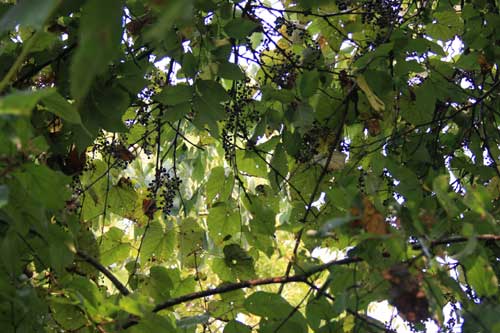
An arbor of fox grapes, Vitis
vulpina, native Kentucky grape.
(*photo
credit)
October 3, 2021 Reaffirming Traditional Marriages
The Scripture readings today (Mark 10:2-16 coupled with Genesis 2:18-26) tells us much about a subject that has high popularity in the ordinary lives of people, namely, marriage or the lack of it. Some of the same-sex couples promote the advantages of marriage and those unmarried couples of different sexes often prefer to refrain from tying the knot -- and ironically both groups cite economic advantages for their intentional linkage or lack of it. The traditional union of one man and one woman is under attack in our secular society, but it is worthy of public defense.
Certainly, as an unmarried person in my elder years of pastoral care, some portion of my time is taken with instructing, counseling, and investigating the supposed bonds of the married or the aspiring married state. As one who has never experienced the marriage state I am in a learning process, but still as a pastor I am entitled to some basic observations: married life is needed as a foundation stone of our society; marriage as a state requires care and prayerful interaction; many are slower in entering the married state today and maybe for good reasons; marriages are fragile and take effort on the part of both parties to evolve and grow; marriages are seen in both traditional and new ways; no party is perfect in strengthening their marriage bonds; often both parties bear blame for cleavage, but sometimes one is more at fault; marriages can be salvaged by counselors and preserved through prayer; and divorces are very difficult for families.
Marriage is sacred. The readings today tell us that the divine will is in the sacredness of the binding of the marriage state. The sacrament is to be undertaken with care and is to be upheld with the deepest respect. The bonds are an outward sign of the divine bonding -- of Jesus' relationship to his body the Church. In some ways, marriage is a foreshadowing of our permanent relationship to our troubled Earth.
Marriage requires careful preparation. This Sacrament is not something to be taken lightly, and so the Church takes the step of two people seeking the married state as a major undertaking. In turn, this calls for time and proper preparation and knowledge. Full consent by both parties and compatibility are most desired.
Marriages are fragile and can easily be ruptured by selfishness and infidelity. Good times comfort married partners and pandemics test their fidelity and permanence.
Marriages are meant to be permanent and must be regarded as such from the start. Christ asks much of the marrying parties and that request must be sincerely honored. However, we know in the world of changing relationships that many do view marriage as somewhat tentative and not a permanent relationship. Let's help struggling couples appreciate their commitments.
Prayer: Lord, help us to champion traditional marriage.

Mystery caterpillar - Reader assistance
appreciated
(*photo by
Sally Ramsdell)
October 4, 2021 Honoring St. Francis as Environmentalist
Environmentalism takes on many forms, and yet each has its place. On this Feast of St. Francis, the patron of ecology, we ought to consider how the saint is patron of various aspects of environmentalism:
Celebratory environmentalism: Francis liked to dance and sing, and maybe we ought to find extra time to celebrate how we are empowered to save our wounded Earth. We ought to join others in gratitude to God for allowing us to live in these troubled times and to be inspired to help address environmental problems around us.
Diplomatic environmentalism: We recall that Francis established a good relationship with various Muslim leaders in the Middle East at a time when interfaith dialog was hardly known. Francis was a rare diplomat and we ought to build bridges as well.
Pragmatic environmentalism: Francis started rebuilding a dilapidated chapel, and this drew others to come and help. By taking a lead in rebuilding our wounded Earth, others may be drawn into the environmental movement.
Gentle environmentalism: A sense of reverence prevailed in Francis' approach to all. Harshness had no place, nor should it today among conflicting parties who need a heavy dose of civility. Francis' approach to wildlife, and their instinctive response, shows how we are to defend and protect wildlife with compassion.
Universal environmentalism: Many of us forget that Francis had a focus on God, but extended that gaze to sister moon and brother sun and all creatures. His relationship to Clare showed a balanced male/female approach to environmentalism. In this modern age our actions should have both cosmic and broadminded characteristics.
Creative environmentalism: Respect builds on the creative powers of others. Francis was not elitist nor authoritarian, but rather accepted that others could and did make contributions to the entire company in which he was forming. We have got to encourage creativity in addressing seemingly insoluble problems today.
Prayerful environmentalism: Our focus must be on the Lord as was the mystic Francis'. When we pray and communicate with God, we increase our awareness that our complex and difficult work can't be done alone, but only through our growing trust in God.
Let's realize that these methods can only go so far, when we confront forces of inequality that can overpower democratic process. Though Francis was not confrontational, still he confronted his family with their expectations on what to do with his life, and did this in a mild but gentle manner.
Prayer: Lord, let us see Francis as an example of what we ought to be and do.

Berries of the roughleaf dogwood, Cornus drummondii
(*photo
credit)
October 5, 2021 Attaining Peace of Soul
Earthhealers strive to heal a wounded Earth -- and they often feel this is not enough. If our planet is in trouble, perhaps it is because we do not expose culprits to an accounting. We treat issues such as pollution, resource depletion, and climate change in such matter of fact ways that we lose the sharpness of our cause. Familiarity breeds contempt, even in environmental matters -- and this dulls our activism. Are we like athletic competitors who train all the harder? "Good, better, best; never let it rest until the good is better and the better is best." Guilt overwhelms us and disturbs our peace of soul. Or seeing that this is a joint work with the Lord do we say, "I am doing my best!"
These two mentalities (striving to be better or accepting what is being done) have inherent dangers: the first can lead to lack of peace of soul; the second allows external work to continue, but we may become complacent and even lazy. If we are not perfect, shouldn't we try a little harder? Much depends on whether we are open in prayer to how much we invest in our activities. Peace of soul comes in doing the Lord's will and the satisfaction gives a sense of internal comfort in that we are doing our best -- and in due time God will show us how to improve our service.
In compassion, we suffer with others in being of one heart and mind in relief and meaningful care. Their ailment may include the stress of pain or of not knowing if recovery is in sight. We need to care for them and our world; this includes reducing their stress by entering into their hopes for improvement, whatever this means. We need to remain internally unstressed and healthy enough to be good healers. Doing God's will brings peace of soul and we thank God for it. God's gift of consolation calls for our gratitude and we should make this sense of thanksgiving contagious, triggering those we serve to do the same. In doing all we can, we show humbly our limitations, but trust that we will improve with God's help.
Our own personal ecology embraces an interior understanding in knowing we are doing our best, and at the same time the counterbalanced external urgency in knowing that more ought to be done. Neither of these in themselves tell the whole complex story of our lives, for a balance comes through divine grace. Simultaneously, we can rest internally with the Lord; all the while we can act externally as though much depends on improving efforts at healing with God's help. The cooperative effort of human and divine working together proclaims the life of a Christian. Being at peace within and agitated without is our condition, but the agitation is with the Lord's help and blessing. Being able to balance interior and exterior deserves our ongoing reflection and ecological thrust. This takes an effort that is not stressful.
Prayer: Lord, help us understand where we stand before you; we can do so much, but only more through your help. If we do the best subjectively, we are trusting that you will help our service improve in due time.

A vegetarian harvest (for a squirrel)
(*photo
credit)
October 6, 2021 Learning and Teaching Tree Identification
Look up at the trees! The leaves are turning color. Many times we identify our companion trees more by their leaves than their shape and bark, which is always the winter challenge in learning about these silent sentinels. Isn't a tree a tree by whatever name? Still, isn't it good to know our companions' name who are comforting and providing us with shade, windbreak, nuts, and wildlife protection. Trees delight us and call for our attention -- and knowing more about them gives us a deeper respect and awareness of the fragile nature of our treasured forests. We know our friends' names; their welfare is our concern.
Learn from the leaves. We couple the acts of "learning and teaching" because many of us non-tree-experts possess a few tree identification books that help us make discoveries with each venture into our local forest. We avail ourselves of opportunities to master the diversity of our tree population and to assist others aspiring to do the same. Thus, we learn and teach at the same time, and encourage others to do the same; we master tree knowledge along with others and not as masters over the ignorant ones.
Teach respect for trees. The season may be perfect depending on wind and moisture conditions at this season within our specific microclimate. Youngsters are often eager with school projects to collect green leaves while they can still be mounted, and identify the various ones more easily before they will fall to the ground and decompose. Because the number and variety of leaves are so diverse, it may be fitting to offer awards for those starting a leaf collection. Learn how to preserve them well through pressing, laminating, and mounting for display. Yes, we can respect and enjoy trees without identifying them by scientific and common names, but the act of learning more about them will feed on itself and improve our quest for ever greater biological detail.
Tree identification has merit. I am fortunate to live within the Mixed Mesophytic Forest, the oldest and most varied temperate forest in the world. At the ASPI Nature Center sixty miles away we have had trees marked through the good graces of a tree expert, and the nearly complete listing of native species comes to over one hundred trees. It was interesting to get students to move about and see how many varieties they could find and record. In so doing it is like coming to know neighbors by name. We can respect a person without knowing his or her name, but in knowing them we are drawn all the closer and can speak to others about their specific aspirations and hopes. We connect the dots of tree knowledge by comparison of types of pines or oaks, where they grow, average age, height, and characteristics of wood and ultimate utility. We learn tree diseases and threats, and this concerns us.
Prayer: Lord, give us the delight to respect trees, to know more about them, to marvel in their beauty and benefits, and to join the ranks of those who want to protect our threatened forests.

A festival of autumn color
(*photo
credit)
October 7, 2021 Confronting Our Vestigial Clan Mentality
Earlier this week we celebrated St. Francis' Feast and heard that his family objected to his desire to follow the Spirit in his life. We also recall that Jesus had great difficulties within his extended family, where some members were hostile to his work. Those closest to us as neighbors or kin may oppose us, and mini-feuds within the clan can develop as much friction as among different clans like the Appalachian Hatfields and McCoys.
Clans have good qualities: they care for members and show loyalty in times of stress and danger. In primitive societies, clans furnish mutual security and protection of life itself. In these respects, the mentality of the clan can grow and develop into a solidarity provided that these do not develop into oppression for others outside the clan. Unfortunately, clans can be oppressively exclusive, for to be clannish means to be enclosed and unwilling to go beyond certain small tight-knit groups. The more broadminded will seek to extend boundaries; see Mark 6:1-6 and especially Luke 4 about Jesus wanting to bring Good News to a broader poor segment of the population.
Confronting clannishness is a Christian duty once we find ourselves within a clan. To be Christian means we must extend to others the good things we possess. The Spirit drives us to challenge the clannish mentality of insulating ourselves within the exclusive comfort zone of a small group. The concept of being "catholic" or universal means we are willing to celebrate with others, especially those who feel rootless and outside of a local clan. We must always be sensitive to the homeless who are migrants, refugees, or workers away from their normal home - and in this sensitivity find the antidote to the clannishness that can easily affect any of us.
A clan mentality can admit of various degrees: from the immediate family to the local group or even to a regional or national level. People have loyalty to local towns, bands, teams, and leagues; they regard themselves as first and strive to build a competitive spirit; in turn, this can lead to a false partisanship that evolves into football team riots or spectators who threaten or injure umpires or referees. Examples of such outbursts are all too frequent both in America and in other parts of the world.
Nationally, clans coalesce into large gatherings and political parties such as the Nazi or Fascist movements. Emotions run wild and people are willing to die for patriotic causes and march off to battle distant enemies. However, even beyond violent extremes some forms of clannish nationalism can be dangerous. The manner in which America treats capitalism, gun control, and total numbers of gold Olympic metals all can have clannish overtones. We must move from all forms of clannishness to becoming global citizens.
Prayer: Lord, you taught us to expand our vision and to look out to the needs of all citizens of one world.
Demand Vaccinations for All
Federal health officials, such as Dr. Anthony Fauci, state that at present rates of virus infection some 100,000 more Americans beyond the 700,000 who have died will succumb to the Delta and emerging variants of coronavirus by the end of the year. Medical experts openly state that these recent deaths could have been prevented had the sizeable minority of unvaccinated Americans followed the majority of vaccinated Americans. It is shocking that this country does not have the wherewithal to halt such a slaughter, when knowing full well how to do it. The only reasonable response is: FOR HEAVEN'S SAKE, PROMOTE A NATIONAL VACCINATION PROGRAM.
Granted, as of this writing we still await a vaccine for those under the age of 12 -- but many eligible adults from a variety of motivations could create a herd effect that would slow and perhaps halt this pandemic. Unfortunately, that has not been the case. In the last few months, we observe one-third of pandemic victims are younger folks over 12 who could easily be vaccinated. These and all unvaccinated adults know that these vaccines are free and easily available in places with willing personnel to perform the task. The facts show that the unvaccinated have had 16 times the frequency of hospitalizations and serious side-effects and most of the resulting deaths.
Total vaccinations for all -- business employees, governmental workers and contractors, military personnel, students (and teachers) from middle school to college, sports athletes and spectators, health workers, and those institutionalized -- and all. Even to save 100 lives, if not a thousand times that number, such a program would be constitutionally justified, as it is for polio and the childhood diseases required for attending school. Other vaccination programs have been successful, and there is absolutely no sound reason for allowing these deaths through this pandemic. In nations with absolute centralized governmental systems such as China this would not be a problem. In America, with the world's highest number of cases and deaths in this pandemic, individualism is honored and operative to such a degree that it precedes necessary social considerations.
In America, we are plagued by a flood of misinformation that is spread rapidly with little hindrance on a virtually uncontrolled Internet and social media. Add to this the distrust of the legitimate media from large numbers of conservative Republicans and others -- a legacy of Donald Trump. Those who resist being vaccinated may have a political motivation or some sort of hidden fears or simple neglect to take the time for vaccination. Contrarians are numerous; some are so misguided that they will catch the virus, be on a ventilator, suffer and die and yet often regret their failures to act. The unvaccinated have motives for refusing, which can be addressed forthrightly. The challenge is to persuade or require these holdouts to get vaccinated; it's worthy of our efforts. Yes, Support Total Vaccination!

Pineapple sage, colors of autumn
(photo by Sally Ramsdell)
October 8, 2021 Saving through Homemade Laundry Soap
From time to time we reflect on ordinary savings, realizing that our desire to be good home economists makes us think with low income folks. I do find savings in using jewelweed and pokeweed berries as medicinals; I air dry clothing instead of using electricity; and I buy in bulk whenever possible. This reflection is a potential saving though I have not yet convinced myself to do it; it is making homemade laundry soap through helpful information offered by Armeda Sparkman of our local herb club.
--------------------
Basic ingredients: three low-priced items that will last for a year or two even with continuous heavy use:
one-third bar of Fels Naphtha (5.5-ounce bar)
one-half coup washing soda (not baking soda)
one-half cup of borax powder
(optional: one tablespoon of essential oil or an added flavor or scent to one's liking)
Preparation instructions: grate the soap and put in a large saucepan with six cups of water over medium heat. Warm the mixture until the soap melts. Add the washing soda, borax, and optional essential oil stirring constantly until all has dissolved. Let the solution sit for five minutes over the heat stirring occasionally. Using a funnel put half the mixture into each of two gallon jugs. Fill each jug halfway full with hot water and shake well. Continue to fill the jugs to full with hot water. Shake again and then set aside for about 24 hours. This gels and looks like egg whites.
Application: Use one-half to two-thirds cup per load. This will not suds up like most detergents, but the clothes smell wonderful. How often we are fooled by the suds!
Added note: You can also add a half cup of white vinegar in rinse water to soften the clothes.
Potential savings: The basic ingredients cost about $3 but the amount of potentials savings over a two-year period could be about $20 to $30. For some customers, the half-hour of extra work (it takes added time for each purchase of commercial laundry soap) is not "worth" it; but isn't that because we have allowed ourselves to be hoodwinked by commercials in the media -- as though the purchased finished product is better than what we can do ourselves?
Prayer: Lord, show us the value of home economics and help us teach and spread the good news to others who are under hard financial conditions at this time. Help us to live more like our lower-income brothers and sisters through such savings.

A touch of golden on the forest floor.
(*photo
credit)
October 9, 2021 Promoting Clean Electric Vehicles
The time for electric vehicles (EV) has arrived and these are increasing rapidly in number. When running a nature center in the 1990s I suggested that we build an all-electric solar-powered vehicle using a car that had been donated for our work. We could see the advantages of electric vehicles where recharging of batteries would be done by use of solar energy and not fossil fuels. Furthermore, there is no need of the weight of a combustion engine and the associated requirements of such vehicles. Range of driving before refueling was and still is a choice factor in going to EVs, but the rapid gain in efficiencies of modern batteries have made this less a problem. Current recharging can extend driving ranges to 300 miles or more, and rapid recharging at a growing number of stations are helping to solve the range problem.
However, recharging with the current partial fossil fueled grit system can be regarded as a problem, since it takes electricity, however generated, to keep the EVs running. Thus, attention must go both to the manufacture of the EV and to the current and expected grit system to keep the vehicles running. Here is where expanded solar energy applications, both from residential rooftops for home changing and parking space solar powered grids for commuters, would be most helpful. It is highly possible that solar, along with wind and other renewable energy sources can rapidly replace the fossil fuel powerplants and furnish energy to the recharging system. In fact, EVs should be able to accelerate the change to renewables.
The price of early EVs has been an added drawback, but with general acceptance and mass production those prices (from $25,000 to $100,000) are already coming down through competition. Add to this tax credit and state benefits, that have even been as high as $7,500, have been helpful. However, such rebates are becoming scarcer at this time due to EV acceptance by a broader range of consumers. Granted, hesitancy could be lowered because EVs save in fuel costs over the lifetime of the vehicle; fuel savings have been as high as 6,000 gallons of gasoline and up to $13,000 in fuel costs over the lifetime of the EV with vehicles averaging 27 miles per gallon. Likewise recall that EVs have no engine cooling system or oil requirements, and they are quiet.
Better batteries and quicker recharges at rapidly expanding fuel stations are addressing opposition. Prices will undoubtedly decline as technology improves and vehicles are mass produced. This year an all-electric SUV is being marketed and Tesla is forcing traditional manufacturers to enter the EV market. There is no reason future EVs could not be lower in price than those using the combustion engine. Certainly, there are EV fuel and maintenance savings, as well as utilizing solar and other renewable energy applications.
Prayer: Lord, give us sound judgment in making energy choices as we move to a renewable energy economy.

Common evening-primrose, Oenothera biennis.
(
*photo
credit)
October 10, 2021 Passing a Camel through a Needle's Eye
Do we tend to forget, overlook, or find an excuse for the rest of Jesus' quote found in today's title, "than for a rich man to enter the kingdom of God"? The crowd was amazed; the disciples were distraught; the followers of prosperity Christianity who take Scripture in their own way scramble for answers. The conclusion is that all things are possible with God, but that does not lessen the impact of the quoted phrase itself. None of us have ever seen camels slipping through needles' eyes.
Do we take Jesus seriously? As with all Scripture, our major efforts ought to be to learn the context of the remark, not the act of plucking it out of context. The focus is not to enlarge needles or slim down camels; the point is to regard the hurdles coming with the wealth that hindered the serious person who approaches but does not follow Jesus, due to the burden of wealth. Jesus tells us that we can do many deeds well and yet the allurement of material things weighs against the deeper calling to follow him. Personal wealth tempts individuals to think they can control their lives perfectly and forget that wealth can move to greed. The holder can be fooled. Jesus reminds us that following him means taking our frailty and associated dangers seriously, and seeing how easily we make wealth into gods of worship.
Is there something wrong with being rich? This answer may disturb you, but think about it! There's nothing wrong with wealth if controlled in common; much is wrong with individually held wealth, if one is fooled into thinking he can control it ALONE, namely, by becoming and remaining rich. Unfortunately, the permissive regulations and enforcement procedures in our country are easy on the wealthy, by giving them tax breaks and tax rates below that of the ordinary citizen. Immense wealth is often regarded as "earned" by holders, and entire political parties and policies are purchased for such purposes. In response: there is much wrong with being individually rich in a material sense, but what is most wrong is that we fail to voice this publicly.
Is following Jesus easy? This goes to how we treat wealth within our hearts, namely, how open are our hearts to following the Lord who lived entirely for and with others as poor in spirit. When our eyes are set on the false security and glittering allurement of money, we may find the answer to be quite difficult. Letting go of what we hold dear is part of the question facing the one aspiring to follow the Lord. Some construct their fool's paradise and seek to justify selfish motivations; they attend to observances of laws and customs as the rich man. However, they are afraid of where the right way of acting will lead them, always to let go of their gods and to turn to the prompting of the Spirit.
Prayer: Lord, give us the grace to take material allurements seriously, to see how these allurements can lead us astray, and to accept our individual and collective roles in following you with all our hearts.

Shiitake mushrooms on log. Franklin Co., KY
(*photo
credit)
October 11, 2021 Distinguishing Different Degrees of Earthhealing
Earthhealing is an emerging concept. Recall that a century ago few would even conceive of the need to heal our planet of some of the mishaps that humans were imposing. At that time few even conceived of the idea that we humans could do harm to the grand Earth herself. Over time, a basic insight emerged: healers also need healing when in the process of healing others. We do not begin from a superior position. In environmental matters, it is not the "healed" helping the sick, but those in process and needing to be healed assisting others struggling in the same process. We are healed in time and with cooperative effort; we reach out to cooperate because it is a difficult task to complete alone.
Another insight is that there are stages of healing both of self and others. With respect to Earth we must first see the current situation where we are located, the HERE, and through a sense of neighborliness, we determine the extent of the emergency conditions of our wounded Earth, resolve to help, and abstain from doing more malpractices, which bring on these harmful conditions.
As we become more expert at healing, we size up the damage and discover the need to act with urgency; we must stem irreparable damage and help restore and reclaim our wounded Earth NOW. This requires utilizing cultural, health, and educational resources at our disposal. Time is critical lest our Earth will reach a tipping point beyond which it becomes nearly impossible to return to a prior condition. Furthermore, appropriate technologies become necessary for these are low cost, environmentally benign, and require cooperative endeavors by neighbors.
A deeper level of healing involves going beyond damage designation, termination, and repair of damage. Healing must get at the deeper causes that spring from a system of consumerism and addiction to insatiable material goods, the extraction, production and disposal of which exacerbate the wounded conditions of our troubled Earth. In order to address the deeper causes, WE must be willing to accept our social responsibility for either causing or tolerating the destructive actions of others.
Only with time does the addictiveness of those who overuse resources become evident, and doubt and delay are deliberate programs by profiteers who promote the commercial addiction to consumer goods. The entire world is drawn into the consumption rat race. and we constantly think we can resolve the problem through rational measures -- but here the healing revolves into merely tweaking the system. Getting at our deeper social addictions requires divine assistance, and so we look into addict recovery programs. The key is to trust in God, and that empowers us to move to a deeper authentic earthhealing.
Prayer: Lord, we trust in you to help us be healers by being willing to be healed with others, to see current conditions as they exist and urgently to look with others for longer-term solutions.

Corn patch. Woodford Co., KY
(*photo
credit)
October 12, 2021 Accepting Positive Criticism with a Proper Spirit
Happy Columbus Day to all who celebrate this day. As a Knight of Columbus member, I have attempted to marvel at the courage of the expedition that led Europeans to the New World -- even though historians have many critical points about subsequent behavior of those who came to the New World. Sensitive people can be hurt by negative criticism and harbor pain for long periods. Often what is meant to be positive is interpreted in a negative way -- and recent pandemic increased the chances of this happening; people are stressed by isolation and lack of close social contact can simply make bad judgments about what is meant to be positive. If meant for positive improvement, accept this carefully and wholeheartedly. Many famous works of music and art were highly criticized by accepted public "critics" of their day, and yet this did not halt artists from their ongoing work nor change the content of the work that they were convinced was of long-t erm value.
Negative criticism for the non-masochist ought to be treated carefully. Granted, we can regard negativity too narrowly and thus be hurt by what others say, especially if we suspect that they are negative people. One reason this website doesn't promote blogging with feedback is that such invites possible negative criticism that is time-consuming when treated conscientiously. Why should we sacrifice much time, energy, and scarce resources just to allow negative personalities to foist themselves in haste on carefully prepared sites? We read interactive blogging enough to know that many topics lend themselves perfectly to others' rants -- and there are other available places for that. We realize that some negative criticism can so dispirit creative writers that they move to another subject and drop their current work.
Positive criticism ought to be sought. In fact, we get more positive critique than we can adequately address individually and respond to senders. It takes time to respond, but we know it is good to do so when possible, for many times such remarks are very helpful. A person who is eager to make our work a better product is a true friend -- and even when the critic seems at first glance to be harsh, it is meant to be for long-term improvement. If the positive folks are truly Good Samaritans, they are willing to spend additional time to see wounds they generate through cutting critique need healing. Taking time is a mark of a positive critic.
Some will say that the open forum for allowing both positive and negative critics to function is good and the sign of freedom and tolerance. As mentioned elsewhere this month, tolerance has certain nuances worth considering. To "tolerate" a path to self-destruction is not tolerance but imprudence and license. The better principle is to dismiss negativism expeditiously. In contrast, to invite positive criticism is always for the better; this must be taken seriously.
Prayer: Lord, teach us to be able to discern the negative from the positive, to avoid the first, and to welcome the second.

Berries of the pokeweed, Phytolacca americana
(*photo
credit)
October 13, 2021 Persevering in the Act of Challenging
On Modern Mythology Day it is a good opportunity to challenge myths new and old, but that is not the point of today's reflection. Instead, let us focus on the major challenges we face defining our own current areas of attention. Certainly, we can help challenge new and immediate issues of which we form an opinion. But what about the ones that stand out and make us who we are. This applies especially if we advocate for radical change.
Once I won a bet with a friend Rudy Villarica; he dutifully paid me decades later for continuing my radical searching when he had bet I would become more mainstream in my old age. But why change issues that we are convinced must be addressed -- and we find constantly challenging us?
To challenge or not to challenge: that is the issue. There are many arguments for giving up on an issue, since few are listening and those that hear often refashion challenges in ways not originally intended. Negligence, forgetfulness, misunderstanding, irritation, and a host of other triggered responses or their lack can be mustered for accepting the status quo and abandoning the radical issue. Many people as they mature regard earlier issues as cute, but of little current importance. For them, one matures and distance oneself from past positions.
To continue to challenge means mustering more forceful arguments. The challenge is to go beyond past arguments and ways of acting, and to seek to discover new ones. In so doing, challenging manifests our faith in the future. Perhaps some day after we are gone, some inspired souls will refashion issues in a fresh light, and find the stated challenges of the past as part of the arsenal to fight for what is right. So, we continue to make challenges with that hope that future generations are willing to tackle unsettled issues of the past in a more conclusive manner. Hopefully they can bring about a redistribution of world resources. That includes fair taxes and a new and just economic system.
To challenge is to be faithful to our past and to allow the good that we have done to continue as testimony to its worth. To say that we confronted certain individuals and subjects some time ago, but the condition no longer interests us is to refute part of our past. We may be right that issues emerge in importance (e.g. global warming or preserving our democracy), but we risk becoming our worst enemies for failing to see connections between old and new issues. To challenge at the present moment is to experience the moment fully with respect to an upcoming future. Amazingly, we continue "challenging" in order to prepare ourselves to respond to being faithful to our mission in life. That testimony before the eternal Judge is the last great challenge on our journey through life.
Prayer: Lord, keep us aware of what needs to be confronted and never allow certain people, lack of time or energy to distract us.

Foliage of the ginkgo biloba, green leaves in
October.
(*photo
credit)
October 14, 2021 Saying Goodbye to American King Coal
Over the years I have observed the switching railyard below my residence move from busy coal trains to a storage yard for empty coal cars. After 2016, the traditional half dozen, 110-car coal trains that come in and depart for Florida and Georgia each week have diminished to none. Silence! In the past decade regional coal miners are being laid off by the thousands from good paying but dangerous occupations; coal companies have gone bankrupt; and new American coal-fired plants have all been canceled. Over half the coal applications are gone and many of the rest await changes soon to occur. The energy situation moved first to natural gas applications for powerplants and now more and more to rapidly surpassing and lowering-priced renewable energy applications.
King coal has been dethroned first by fracked natural gas, and now by wind, solar and other renewable energy sources. Some anti-environmentalists would like to cast blame on tightening restrictions on toxic gaseous emissions from coal-fired power plants, but that is only a part of the story. Revelations about increased incidents of "black lung" among young miners in areas of recent mining amid silicon-type rock formations is another concern, but not an immediate factor in coal's decline. The criticism of mountaintop removal is certainly ongoing, but it has not stopped the remaining operations from continuing even now.
The fact of dirty coal emissions has weighed on our moral resolve for half a century. The soot is one thing; the lung- harming emissions are another that cannot be denied. Low cost natural gas has its emission effects also on the climate change picture and so that transitory fossil fuel is also dirty enough that renewable energy sources are the only complete answer. There is enough leakage of plentiful natural gas that the extra methane in the atmosphere only adds immensely to the greenhouse effect that must be curbed. Fossil fuels for energy, whether natural gas or petroleum or coal must be reduced or eliminated in the very near future, but the process moves at too slow a pace.
Coal is not the only fuel victim; nuclear power has its high construction price, cost overruns, safety issues, and general uncertainties, and utilities are reluctant to build new nuclear plants. Jobs to either coal or nuclear applications have been well paying, but the decline in employment does not have to be severe if more efforts were made to transition miners to solar, wind and other renewable energy applications -- all needing equal or greater numbers of well-paid jobs. As a Kentuckian, I hate to see coal miners lose their jobs; as an environmentalist, I have very mixed feelings about the transition period, for emissions from greenhouse gases continue throughout this decade; the nation lacks the will to advance renewable energy promotion and support of the 2015 Paris Climate Change Accord. All in all, good bye king coal!
Prayer: Lord, teach us to use all things wisely and well. Inspire us to renew our economy as rapidly as possible.
Confronting Unvaccinated Individuals
Publicly supporting a Total Vaccination Program during this pandemic when free vaccine is available and effective is one thing; getting holdouts to agree is another. America, with its overwhelming individualism (let the public be damned), is certainly an arena of utmost challenge. Many talk about this in various ways and yet 70 million adults still need to be vaccinated, along with children under 12 who currently lack access to an acceptable vaccine.
Voluntarism is not the effective approach. Certainly, try to persuade as best you can, for we champion volunteers as workers and charitable donors. Yet most of us are aware that strict coercive methods prove better and is more worthy of consideration when death is involved. In this pandemic, contrarians do a disservice and are a liability to the social system through their refusal to be vaccinated. Do those who refuse enjoy exercising their power when a system recognizes their "right" to abstain? However, here is a clash of rights: preserving the lives of virus victims has precedence over another citizen's "right" to choose to refuse. Furthermore, it is difficult persuading individuals on a person-to-person level to change attitudes.
Institutional coercion can be the second-best thing, if it is difficult to persuade the national government to act. We must make every effort to get labor unions, religious groups, local and state governments, National Guard, major and minor businesses, colleges and other educational institutions and all health care facilities to require total vaccination. An additional major area is to require sporting and major gathering events to be only open to the vaccinated. We should influence more of the groups to make these requirements and thus save our personal attempts with unvaccinated people. This may prove a better use of our own persuasive resources, rather than spending time nagging individuals.
Major coercive methods are far superior, when actions must be taken immediately, but will they be initiated? An effective vaccine exists to reduce the severity of the virus attack and could stop most of the possible hospitalizations and ultimate deaths associated with the virus cases. If it happens that some of the people who are more subject to attack and cannot now receive the vaccine for some reason, then their constitutional right to life is being threatened by the calloused disregard of the unvaccinated. Constitutionally, health workers with the proper equipment desire to exercise their duty to protect all citizens. This should be considered a national issue worthy of top-down requirements. What is at stake is libertarian thinking, or the solemn right of non-participants to remain as such through their personal choices.
While a total vaccination program could work in the national interest and save 100,000 lives, let us reflect next week on why America as a nation is reluctant to act accordingly. Can we make changes?

Goldenrod, reclaiming a newly-opened prairie.
(*photo
credit)
October 15, 2021 Rendering Hospitality and Friendship
Each year different American communities are designated as the "friendliest town in America." Vancouver, Canada has the honor of being named the "World's friendliest City." Kentuckians pride themselves in their hospitality as do others, but it does take effort to create a welcoming community atmosphere. Desert people in the Middle East are known for this practice, for unless one welcomes travelers, they may die without water. Because God has been hospitable and friendly to us, we seek to be godly by inviting others into our lives. We get comfort recalling when accident occurred or we really needed something, strangers befriend us and help us overcome our need. It was not our merits that allowed this hospitality, but rather the goodness of their hearts.
In India in 1988, two college students befriended me and acted as tour guides when I was inadvertently on a bus with Hindi pilgrims on a trip from New Delhi to Agra; they explained the shrines and even bought me a soft drink. To my protest they said that, when in America they will receive hospitality in return. Again, in the middle of West Virginia, when my truck broke down, it took several hours for roadside mechanics to finally get it going; they refused any payment, saying they would expect the same if needing help in Kentucky. Generosity and hospitality go hand-in-hand. In 2001, travelers who were stranded in Canada on flights back to the United States (when airports were closed due to the 9-11 attack) spoke of the immense hospitality of the residents of the Maritime Provinces.
General hospitality should be part of our trademark as a locality, a church community, a nation, and our Earth herself. To welcome another takes some effort, and yet it is most deeply appreciated. One minister puts barrels of water on the illegal migrant routes from Mexico through hot Arizona and is credited with saving numerous lives during the height of such trafficking in recent years. Hospitality is welcomed by immigrants, tourists, hard-luck travelers, wildlife, and anyone in a foreign place. It is in the depths of our religious commitment that we understand this demand to assist others in need. When hospitality is refused to us, it hurts; when hospitality is offered, it is appreciated.
Welcoming takes a little sensitivity knowing that the person is a stranger and in need of something. Anticipating this is seeing another who is hungry and the Lord judges our growth in sensitivity. "You fed me when I was hungry." In one way we are all strangers and guests and seek and appreciate the Lord's continuing generosity. In turn, we are called to do godly deeds, even if we must go the extra minute or mile to do it. A friendly face means so much to others; we need to make this a habit of mind, heart and composure. Smile!
Prayer: Lord, you opened your heart to each of us while we were still sinners. Help us to open ourselves with friendship and hospitality to all others.
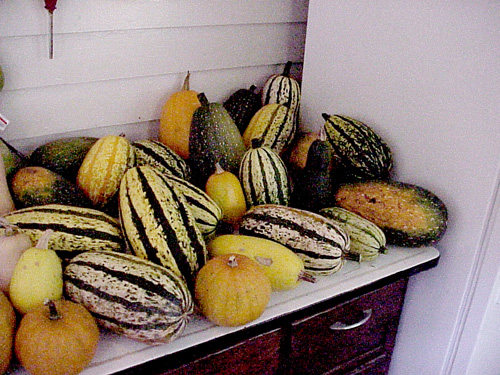
A fresh harvest of autumn squash
(*photo by Sally Ramsdell)
October 16, 2021 Observing World Food Day Today
Food accessibility and security is a major world problem -- and involves over a billion of the lower income on this planet. A recent analysis says that 247 million people face a possibility of starvation if aid is not forthcoming. Those attempting to live within a limited food budget want to provide for themselves and their families enough to keep them healthy and contented. True, there are shortages of some foods due to fluctuating crop yields of specialty items, but let's not forget that 40% of the American corn crop goes to production of biofuels. Many in the world do not have the luxury to vary their foods, but they are in search of basics that could be safely shipped to them. Food purchasing is difficult for people in countries where the staples of rice, flour, or cooking oil are not subsidized by governments.
Rising food prices are partly due to fuel costs, but more is due to scarcity of local supplies to meet immediate needs. Added distribution takes resources within nations with limited financial resources. The speculation by traders in food supplies is to be exposed and controlled at a global level but this is a difficult matter. Subsidies by the world wealthy community must be allotted for unfortunate people such as those in parts of Africa who suffer from drought and famine. In this world of rapid and accessible transportation and with a generous world supply of food, redistribution to those in dire need is a necessity -- and careless disregard is a crime against humanity. Hunger is not tolerable anywhere, and we all must focus on those with immediate needs.
Nationally, there ought to be no hunger in this country in which high food costs threatens adequate nutrition for some. Worries occurred during the pandemic when schools were not in session some youth were short of breakfasts and lunches. Food surplus programs have been particularly hard hit by reduction in funding from those who have no true sense of what tax dollars ought to buy -- so the poor are often hit harder. Food stamps are available to a fifth of Americans and are one answer to food shortages and higher prices. Food stamps ought to be limited to foods of nutritional value and not for soft drinks and junk food.
Locally, here in Appalachia we have our food problems. People come to our door mainly at the end of the month begging for food -- and they truly need nutritious food. Expensive commercially prepared foods and fast foods cut into anyone's food budget and especially those of limited means. Wise purchases in quantity and types of foods that can be prepared at home (soups, salads and home-cooked main dishes) are ways to stretch the food budget. One of my parishes sponsors a weekly "Moms in the Morning" program -- and people learn to be wise purchasers and cooks. All Americans need to return to economic ways and learn from survivors of the Great Depression. Are we approaching that stage once again?
Prayer: Lord, give us the courage to budget food wisely and teach others to do the same, for their own nutritional wellbeing.
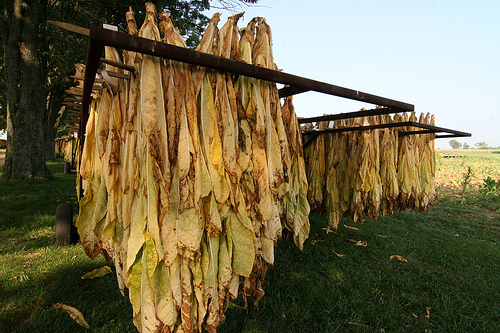
Tobacco harvest, Pin Oak Farm (University of
Kentucky)
(*photo
credit)
October 17 2021 Comforting Afflicted; Afflicting Comfortable
The Son of Man has not come to be served but to serve.
(Mark 10:43-45)
I borrowed the title from someone else; so, thanks to whoever that might be. In fact, it could be a motto for those who seek to follow Christ. Note that the rich man goes away disappointed because he has riches and finds them most comforting. Jesus shows mercy and love; he comforts the afflicted (ill, forsaken and sinners); each time he encounters a blind or afflicted person, Jesus addresses the situation through kind words and healing deeds. He is sensitive, because he is in solidarity with the poor and identifies with them in their suffering through compassion.
Comforting afflicted. Jesus gives comfort and that is very evident, but his miraculous healing is beyond our powers. We, who are called to heal in less dramatic ways, regard comfort as something to give as servant to others, but always with a sense that it is never perfectly adequate. Socially medical improvement is the working of the Almighty in our midst. Let's not minimize our own powers; we are empowered to comfort and must be humble about the limits of healing. We strive within the limits God gives us; we do not take pride in our achievements, but realize that we are the comforting hand of God in our world.
Afflicting comfortable. Last Sunday we read about a person of great wealth who obeys the basic commandments, but he has not reached to a deeper level of solidarity with God; this entails giving up wealth and becoming poor in order to follow Jesus. He does not see that part of following the Lord is to help establish the Kingdom of God. His is a story of partial success, a story of sadness coming over the countenance of the rich man. Jesus never uses harsh words or threats; he looks steadily at the inquiring man and loves him for goodness being manifested. The discomfort is caused by confrontation within the person, a demand to retain wealth when spiritual success is actually elsewhere. Thus, the man with all the contentment of self-righteousness and wealth suddenly finds that this does not ensure continued comfort. It is more comforting to suffer with others in this world -- to be with Jesus.
Our healing applications make us ask some searching questions. Do we not live in an age of great affluence when the middle and even some of the American lower income have indoor plumbing, air conditioners, space heating, and adequate supplies of food? What about the rest of the world? Do we take food security for granted? Are we willing to follow Jesus and forego the comfort of the present living standards for the glory of God? Are we willing to confront others when affluence triggers insensitivity and threatens someone's eternal life? Has the pandemic forced us to consider our individual and collective outlooks when dealing with vulnerable people with health conditions? Difficult questions!
Prayer: Lord, teach us to be of service in following Jesus, and to discover and assist those in need today.
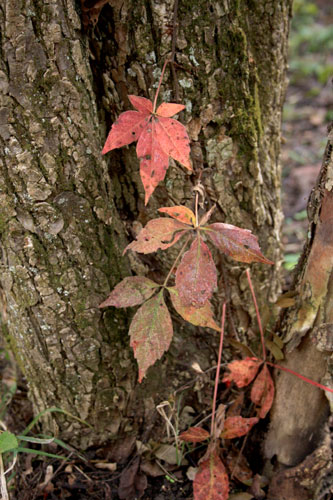
Autumn color of the Virginia creeper vine, Parthenocissus quinquefolia.
(*photo
credit)
October 18, 2021 Being Political but not Partisan
In this year with its rough political beginnings, we are resolved to follow the course of legislative history, especially with reference to curbing climate change. This is a major problem of this decade and cannot afford to be relegated to mere partisan politics. Oceans are rising and extreme weather conditions are becoming more frequent. We must act to save a threatened world and the U.S. must take a leading role. If we fail to collaborate with the rest of the concerned world and go our separate way, we as a nation could be at grave fault.
The time to work with others is now. But we must start acting at home. Curbing climate change is a non-partisan issue and we must see it as such, so that national cooperation is feasible now at this time of urgency. Partisan political wrangling is out of the question, for our joint quality of life is involved, along with that of the rest of the human race. Here are some principles worth keeping in mind by all concerned citizens:
Principle One: Know what must be done as far as climate change is concerned. Study the issues and instruct others as to the details. Our knowledge may be local, regional, national and global, for this critical environmental issue is complex. We must give full moral and financial support to the 2015 Paris Climate change Accord, for our nation has been a prime polluter over the past century; we now must take full responsibility for renewal efforts.
Principle Two: Contact all legislators of both political parties and have them commit themselves to doing what must be done at this stage in the environmental crisis. This commitment must be public for all to know the seriousness of the situation and the need for cooperative endeavors on a bipartisan basis. Our political involvement keeps legislators on their toes.
Principle Three: Weigh matters according to Social teachings concerning protection of the Common Good, the right to life in its full and extended form, the vitality of the democratic process, and all our constitutional freedoms. The matter cannot be relegated to a secondary issue, for this would play into the hands of the remaining fossil fuel profiteers.
Note the extraordinary impact of anonymous money that is used to cast doubt on the seriousness of this issue. Prolonging fossil fuel applications may be profitable to Big Energy, but it only deepens the climate change problem and could result in a catastrophic situation where global temperature rise could be as high as three degrees Celsius. Our resources are limited but must be focused on renewing our economic system and preparing for drastic reductions in fossil fuel uses.
Prayer: Lord, we ask for the wisdom as democratic people to assist in bringing our nation to take a leadership role in proper environmental action at this critical time.
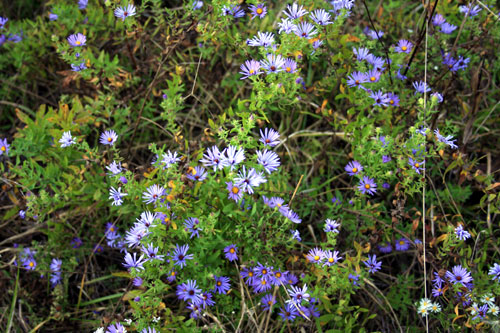
Lush patch of aromatic aster, Aster
oblongifolius
(*photo
credit)
October 19, 2021 Feeling the Agony of a Dying Language
When in Alsace several times I recall having meals with my late cousin Martha. Her primary language was Alsatian, though her next two generations spoke French. It is a rule that when the children stop speaking the parent's language, then that tongue can become endangered -- and so it is with Alsatian, the language of my own grandparents. Half of the world's over six thousand languages are expected to become extinct in the 21st century, and quarter of total will also be threatened by the year 2100. Threats to language are like threats to all plant and animal endangered species, for each language is embedded in a culture with all its fine points and richness -- all part of our past traditions.
"The Death of a Language" in National Geographic (July, 2012) gives a different approach worth emphasizing. This borders on a personal approach to struggling language groups and takes us into the lives of people in three endangered language groups. It involves the heroic efforts on the part of some to give these endangered languages new life, and allow readers to see the agony of people facing a dying language. Perhaps this approach may enhance respect for struggling tongues; it triggers compassion for those last survivors in their utter loneliness when the culture so dear to them cannot be carried on because no one cares to do so.
Imagine the loneliness of a dying language's last speaker. Estimates are that two such occurrences happen each month on this planet. Dying is never easy, and is our ultimate battle in mortal life. However, surrounded by loved and caring persons who desire to carry forth a memory gives comfort to a dying person. However, agony is greater for a person with use of mind, who recalls the richness that was expressed in younger years among family and friends in a tongue now no longer shared. This creates a terrible onus on the part of last survivors. No one will follow and laugh or express themselves in the poetic ways of that language pattern.
Comfort of the dying could occur when the person knows others are willing to regard their fading tongue as a treasure worth preserving. The threatened language expresses reality in ways that other tongues never captured -- and thus endangered culture is worth preserving. Opportunity comes with effort to record the language, while final remnant populations are in good health; thus, posterity has a trace to the endangered cultural past. Still, far more comfort comes from neighbors and local youth who rap in the dying language and thus revitalize it and give it new life.
Earthhealing involves more than healing present wounds. It includes recognizing valuable past expressions from an endangered culture. We can memorialize our past through preserved records. The agony of a dying language should not be overlooked, but taken with compassion. The issue is worthy of the Earthhealer.
Prayer: Lord, teach us that the past has value. Help us respect global threatened languages as treasures worth preserving.

October 20, 2021 Honoring Kateri: Patroness of the Environment
St. Kateri Tekakwitha, the first Native American from North America to be canonized; she has the sub-title of "Lily of the Mohawks." This 17th-century maiden has been blessed by God in special ways, for her life was one of singular devotion to prayer and good works. Since her death a number of miracles have been attributed to her intercession, including a boy with hearing impairment and a man, after losing sixteen vertebrae and other complications in an accident, is able to walk again. But she was close to the land and thus is regarded as patroness of the environment.
Kateri had a hard life. She was born in 1656 in a Mohawk village near Auriesville, New York. Her mother was an Algonquin Christian and her father was a pagan tribal chief. In 1660 a terrible smallpox epidemic swept through the area and Kateri lost both parents and was left facially scarred for life along with impaired vision. She was raised by an uncle near present day Fonda, New York. She became a Catholic at age 18, but received threats and ridicule in the village due to her vow not to marry. In 1677 she fled to St. Francis Xavier de Sault, a Christian Indian settlement in Quebec and lived there in her few remaining years. Her simple life included teaching children, tending to the sick and elderly, fasting, and attending religious services. Kateri had an ecological practice of making little crosses and placing them in the woods among the trees, her prayer stations. Her ill health drained her and she died in 1680 at 24 and is buried in Kalinawake near Montreal.
Like St. Theresa, the Little Flower, Kateri is a source of special favors since her death. In fact, recovery from a serious operation of one of our parishioners could be attributed to Brenda's devotion to Kateri, whose name she took at her Easter Confirmation. Special favors by God manifest the closeness of the community of saints with us here on Earth, and shows the depth of our mission as members of the Body of Christ. Amazingly, those saints who are most exemplary are often very simple illiterate folks like Kateri. God's power unfolds in each of them!
Prayer of St. Kateri Tekakwitha
God of all creation, goodness and mercy, our hearts are filled with gratitude and praise for you. In our beloved St. Kateri you have found gentleness and peace. In her you have heard once more "Jesus, I love you." In St. Kateri Tekakwitha you have given your Church a new maiden of the Gospel for your Son.
As the indigenous peoples of North America celebrate her goodness, and all the Church honors her holiness, we raise our voices in praise and joy. You have given us a gift beyond all measure, and we ask you to help us celebrate this treasure as we live holy and peace-filled lives in your name.
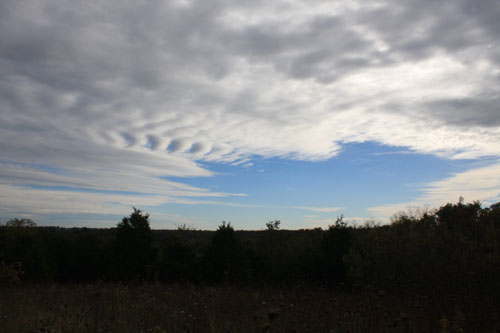
A spot of blue sky in a sea of clouds
(*photo
credit)
October 21, 2021 Limiting Food Intake and Being Aware of Obesity
This is not my favorite subject, because this calls my own eating habits into question. For me, the problem is not the type of food, but the incessant quantity consumed over a span of time. This is a special temptation in localities where food is celebrated, well cooked with good aroma, relatively plentiful and easily accessible with no one to block the way to the frig. Add to this the problem of being in a culture where restaurants are nearby and advertisements show tempting dishes at relative low prices.
Overcoming the temptation to eat too much of good things takes will power and that is sometimes difficult for active people. However, the combination of good available food and a generated legitimate desire for enough food to do one's work gives way to a perfect "food storm." We can soon exceed what we need and in doing so gain weight. Some weight gain may be tolerated, but not all, for almost half of the vulnerable American population is overweight. In fact, with current obesity so pervasive in our country, domestic airlines have been obliged to recalculate average weight of a passenger load.
Obesity is a plague of our nation and parts of our world, affecting its sufferers with reduced mobility and associated heart conditions, diabetes, gout, and a variety of digestive and allergy problems -- and greater susceptibility in this pandemic. When corn and soybean crops are harmed by drought, Americans could respond by curbing food intake, but ours is a land where food is a relative lower portion of our total budget. Perhaps we ought to conserve for the sake of a hungry world, and especially with the frightening statistic that about one-and-a-half million Americans go to bed hungry for lack of available food. While the tendency to overeat is a plague, it can be handled successfully with sensitivity and cooperation by individual victims and their associates -- and with prodding from health professionals.
The difficulty with eating disorders is that a good appetite in among a healthy supply of good foods is salutary. Lingering too long amid such plenty and with less than perfect self-control can be a hurdle that requires will power. I note that when at potlucks and feasts some cooks watch to see that I take some of their specialties, and so I take a little of everything to make everyone happy. Good as far as it goes, but in short order I can exceed normal limits and that is a concern of weight watchers. One solution to regain will power is to fast occasionally, and try to live on only liquids for a day at a time. This is a helpful resolution that can be kept, if well planned in advance and without available tempting foods to entice the fasting person. Fasting has many salutary effects, but done for the good of a hungry world can make us more global in our food outlook, and more sensitive to those who cannot afford good food.
Prayer: Lord, teach us to enjoy the good things of our lives such as food, but to do so respectfully and with temperance.
Challenging National Attitudes
A national policy of hands-off a coercive requirement for total vaccination during this pandemic, even with 100,000 possible preventable deaths, seems unreasonable. However, such a policy is the offspring of other unreasonable practices at the national level. Let's consider a combination of disregard for life in modern warfare, risks from possessing and willingness to use nuclear weapons, and a strong dose of libertarianism even within progressive ranks; these are part of our national philosophy.
Our country has a recent history of disregard for lives of people, including non-combatants. Did it start with General Sherman’s march to the sea and disregard for the livelihood of Georgia's civilians? Or was it Fascist bombing of cities in the Spanish Civil War? Or was it the World War Two uncritical acceptance of British night raids on German cities hitting populated areas -- and then the Hamburg and Dresden firestorms? It may have been the words of General Curtis LeMay as he fire-bombed Tokyo in March 1945, "no matter how you slice it, you're going to kill an awful lot of civilians. Thousands and thousands." Then the immorality extended to Hiroshima and Nagasaki in August 1945 and a hundred thousand more deaths. Paraphrasing Stalin that one person is a death, one million is a statistic, is not a hundred thousand a statistic as well?
Americans have grown hardened by immoral killing and have even championed the constant threat of First Use of Nuclear Weapons, which if engaged would be suicidal, or better "omnicidal" (Daniel Ellsberg, The Doomsday Machine: Confessions of a Nuclear War Planner). Allowing the use of this threat for seven decades has hardened our American mentality, allowing the risk of "nuclear winter" (destruction of all civilization) through deliberate action or accident in use of nuclear weapons. Are we willing to engage in irrational risks which just might extend to national health issues?
Libertarianism is the third ingredient within the realms of our national mentality; this has infiltrated the very liberal ranks that could normally conceive of a national coercive requirement, such as a total vaccination program. This is exemplified in the pro-choice versus pro-life abortion issues, namely the preference of individuals to have their "exercise of right" regardless of the effects on other human beings. The reasoning carries over to the so-called rights of individuals to personally avoid vaccination.
Now add these three somewhat divergent issues into a national cocktail that becomes American thinking and we can see the paralysis that envelops our nation at this time. We could have a policy that would save the lives of a hundred thousand people, but who cares if people die, or we take unnecessary risks, or we allow individuals to act as they please? Why involve social justice? It is time we reflect on moral issues and approach the possible early death of our people as demanding a Total Vaccination Program.

Shades of autumn.
(*photo
credit)
October 22, 2021 Practicing Meditation in a Busy World
October is generally a busy month doing the ordinary things of life, performing autumn tasks, and preparing for winter months. Do we have or take time to stop and reflect -- and take the daily sabbaticals that are as needed for proper focusing?
Meditation as sacrifice. Some part of the day ought to be specifically reserved for the Lord even if we strive to "pray always" in rather informal ways. Sacrificing a period of time to the Lord shows that we are not the master of our time, but must regard all as gift from God -- and some periods of time ought to be made more dedicated than others as a sign of gratitude for time.
Planned but not concretely set in time. Much depends on the way each of us sets up our day. I confess it is hard without reserving some period in the early hours for the time span of "meditation." This is true even if not rigidly assigned either as to span or a definite part of daily routine. Praying in a special manner each day is important, though some more rigid planners may actually block off meditation time on their schedule. Busy people will read a passage of Scripture or meditate at a given period of the day. President Lincoln would do this on a daily basis, even on the day he was shot. However, for some of us, overly rigid scheduling could be quite burdensome and repressive.
Subject matter is not rigidly set. Some may meditate in a very special way each day and have determined the manner that suits them best and the specific subject matter. A blessed peace of mind beckons their routines. Others of us may be methodical in some portions and not in others. I like to use the Scripture passages of the day's regular liturgy, and then focus during the weekend on the Sunday themes either in anticipation on Saturday or in post-reflection on Monday. Again, this is one approach. The emphasis is on choosing what suits each person's way of meditating.
Formal posture. Formal posture is regarded by some as better suited for success than informal posture, but here again choice is left to the individual. However, the argument that the body must enter into the prayer period has a long tradition. Generally formal beginnings and endings are regarded by the masters of spiritual life as key to success. Setting aside meditation time along with a generous heart are the major components. Over-rigidity in the way we stand, sit, stroll, kneel, or adapt a yoga position is not as important as placing ourselves before God for a time period each day. God gives us the space to create our heart in a special way -- and meditation is the time to do this. Placing our hearts always before the disposal of God is what is sought as the end of meditation -- not the embellishments wherein observers would demand a proper posture.
Prayer: Lord, help us to reserve the time, focus our minds, and keep occupied in meditation to the best degree possible. Help us make this as a wonderful opportunity during our busy day.

Harvesting of research plots, University of Kentucky farm.
*photo
credit)
October 23, 2021 Polling Numbers: What Do They All Mean?
Many of us are skeptical about the numerous polls and yet we know they do capture a mood of a people at a given time. However, we do start to question who it is who answers or has access to poll-takers when many of us never participate. Are groups of individuals excluded from polls? Have you ever been asked a question and the phrasing of the question presets the answer, though in truth we have never really given much time to what the question means or what results are expected? Often people give what is the expected answer, even if down deep they have not made up their mind. Yes, polls may influence someone in how conducted.
Polling is big business. Polls show that in large numbers, people favor environmental protection, renewable energy, good government, enlightened leaders, purchase-free elections, national security, drug-free areas, physical exercise, sportsmanship in games, and on and on. However, favoring does not necessarily reflect how the polled always behave regarding these issues.
Polls have disadvantages. So often we read or listen to definitive matters being commented upon by "experts" on political or economic issues; they preface their remarks by quoting polls that can be taken seriously or not. However, this gives the false impression that the opinion expressed is solidly based on fact, but what fact? Polls may give the impression that what is happening is properly recorded, but it may not be. Answers may be from people wanting to satisfy pollsters. Polls do reflect changing opinion, but this may mean that many people are influenced by immediate news accounts. Polls may show current views but not long-term trends.
Polls are influential. Let's refrain from being cynical about polls, for a more neutral stance allows us to learn much from them. Sometimes the generalized opinion is transitory, but polling may be a wake-up call. In some cases, we are led to believe that our opinions are those of the majority, but some polling can bring us to an overlooked but pertinent issue. We may think that situations have foregone conclusions, but they are not yet decided. Shifting polls make us aware that opinions are in flux. Polls may prepare us to fit into certain categories of people, something we either welcome or despise. We may accept our status, or we may shift our own position more in line to a more socially acceptable category.
Polls are limited. Perhaps people take polls as too set in stone, and they fail to see polling limitations. A passing opinion may prove that an issue is popular, but it does not prove everything about what we will think next week. Polling is scientific if the poll is collected using the canons of good questions along with proper statistical collection. A wise person has something more to say on a subject than a million with flighty opinions based on a vaguely-phrased question.
Prayer: Lord, let us see what is ahead with the clarity of faith, and not through the dictates of shifting public opinion.
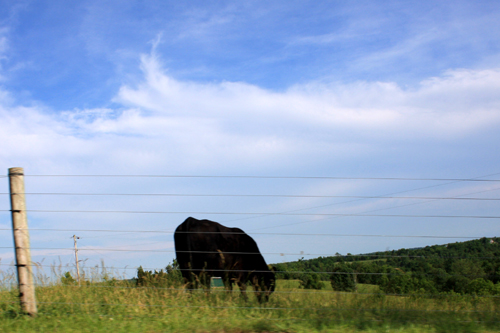
"Chewing on a cud by a contented cow..."
(*photo
credit)
October 24, 2021 Begging for Divine Help Today
Master, I want to see! (Mark 46-52)
I stumble in the dark when I attempt to blindly move forward on my own alone. As our eyesight fades, we realize our weaknesses and that mobility might sometimes require guidance and direction. Our individual powers of self-subsistence are simply not permanent. We become blinded physically, intellectually, emotionally, or mentally and find our mobility impaired in a fast-moving world demanding precise responses.
Like Bartimaeus in the Gospel passage today, we blurt out a prayer begging to see the road ahead, the problems challenging us, and the decisions demanding emotional and mental balance. We are in need and know it; we turn to God in our utter privation. Are we, as some would say, unable to lift ourselves up by our bootstraps? That's physically impossible. Don't we need really assistance? We seek God's help and, in due time must humbly admit it. This is a rather elementary article of faith, even though many in this world fool themselves amid their supposed self-sufficiency.
Scripture involves numerous travelers coming to faith and striving to do so with the help of divine grace. People need faith and strive to assemble as a people who must come together and pray with each other -- for acting alone is not only frightening but wrong-headed. The world of competition for the power to do so many individual feats, or to pretend one can, is in need of a shaking up. We are not alone, nor are we supposed to be. Being with others is at the heart of congregating, such as the birds that are flocking together at this time. Within community resides strength.
Grouping of animals tell us naturally what we find hints of on the spiritual level. Ours is an age of strident individualism and some holders of public office compare themselves with others as though the battle is of one individual against another, when neither are able to do much ALONE. We need to turn attention in our choices to associate with those who can be more interactive in what they do and say. We work best in cooperative endeavors.
Let us face our blindness, not as individuals such as poor Bartimaeus, but through prayer to attain union with the Lord. Faith then is the quest from solitary isolation to sharing in community, from isolated addictions to cooperative rehabilitation and renewal. Bartimaeus is blunt in his prayerful plea, for in seeing he will be able to unite more fully with others. In truth, some with forms of blindness will not receive a miracle that cures eye problems, but in praying for help they will be enlightened and inevitably receive the assistance needed to carry on; they will gain an attitude that will allow them to inspire others.
Prayer: Lord, grant that I might see how others are assisting me in so many ways. Allow me to surrender fierce independence as part of maturing faith journey and to unite more closely with you and with all concerned citizens.

Caterpillar of swallowtail butterfly.
*photo
credit)
October 25, 2021 Bearing Arms in a Permissive Society
While the movie house was packed for a premier of a somewhat violent film, a half-crazy person entered and opened fire using an arsenal of weapons and ammo that he had acquired legally. For a split moment the audience was confused by the gunfire on the screen and that of real life, as seven dozen people were killed or wounded before their eyes. Just how many in this addicted land will see the connections here is a mystery, though this happened a decade ago at Aurora, Colorado. Much hostile gunfire occurs this year.
All Americans find fault with a deranged individual who goes to excess, because he does not know how to control himself in a semi-deranged society that permits guns and depictions of extreme violence in the media. Can we expect the entire society to exercise balance when it does not know how to properly use deadly weapons? We all wonder about how we are to change our conduct to meet the needs of gun-loving people with more firearms than there are people -- and ammo. Enough guns are enough, and that a muzzle-loading previous generation had no knowledge that "bearing arms" within a community could be interpreted as an individual's right to automatic weapons with a carload of ammo.
One solution is that the license to bear arms may be held only by law enforcement officers and professional guards who have access to such ammo. In other words, all these high-powered guns American homes could not be collected and destroyed, but the ammo would be severely limited. Even hunters would be allowed only a few bullets per year. One wise father would only allow his son to go hunting with one bullet. "Now bring us home a deer." To bear arms is one right; to be able to have limitless projectiles is another. "No fair!" screams the Gun Lobby.
A misinterpreted second amendment of our Constitution triggers them to tout the "right for individuals to bear arms" and forget that the document was written with a cooperating community in mind. The framers had no sense of automatic weapons or a selfish generation demanding all sorts of rights be permitted, even for those who are mentally unbalanced. In these permissive times those in the latter category are not hindered from purchasing arms or ammo on the Internet; weak enforcement laws hinder action. Only 844 of Kentucky's 35,461 mental cases are on the no-purchase list.
America must wake up. We do not have individual rights to automatic or high-powered weapons, no matter how much profit is in gun manufacture and sales. Our nation can have better ways to improve the economy than to invest such sizeable sums in military expenditures. People are triggered by the virtual violence to act in strange ways, and violent incidents will only increase if we do not take strong measures to control weapons and ammo within the general public. Rights do not mean license to do as one pleases.
Prayer: Lord, inspire us as a nation to come to our senses on such matters as critical as the ownership and use of guns.
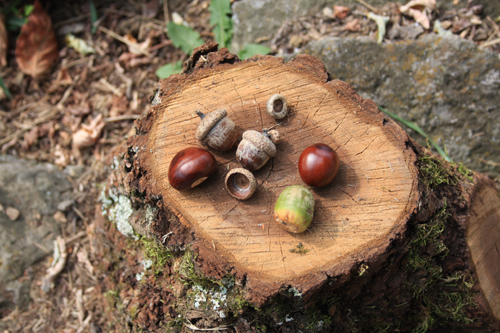
Feast for a squirrel.
(*photo
credit)
October 26, 2021 Selecting Hickory Nuts as a Labor of Love
Among some of the most pleasant Autumn Sunday outings that I remember in youth was that of a family trip to the mountains to gather hickory nuts. It was not just any old hickory nut, for we lived in hickory nut/oak forests and wanted the larger shag-bark variety that were easier to hull and extract the kernels. We had some hickory-nut trees near our home but they were smaller nuts, or what we called "pignuts" and were difficult to extract the edible portion once cracked (a tough enough job).
This extractive facility was of deepest importance because Mama had her favorite hickory nut cakes that were baked in the autumn and apportioned to a select list of relatives and friends who delighted in her baking finesse. Each of the recipients was fully aware of this labor of love and the amount of time it took to crack the nuts and extract the kernels. The amount of time made a pound of hickory nut meats extremely valuable and something you hardly ever found on the market. Recall that this tedious task was far more difficult than picking meats out of thin shelled English walnuts.
Mama's secret was not so much in the baking, but in the economy of time needed to crack and extract the kernels. She became expert in cracking the nuts open but not crushing the compartments so that it would be impossible to extract the edible ingredients. She used a ball peen (machine's) hammer and a flat iron for the base on which to rest the nut; then followed days of work picking out the kernels from the cracked nuts.
Mama's hickory nut cake recipe is as follows:
one pound of sugar
one pound of real butter
one-half tumbler of apple brandy (five ounces)
one pound white raisins
one pound of flour
ten whole eggs
one-and-a-half pounds of hickory nut kernels
one-and-a-half teaspoon nutmeg.
Cream butter and sugar until light; add egg yolks beaten separately, then add nutmeg. Stir in apple brandy, stir in all but one-half cup of flour (to flour nuts and raisins). Add them to the batter. Beat egg whites until stiff; fold in batter. Pour in mold ten-inches in diameter and four-and-a-half inches in depth. Bake two and a half hours at 200 degrees F. Cover cake pan with brown paper sack material cut to fit in the pan; grease paper on both sides with a little lard and place in pan. Cake can be covered with caramel icing.
Prayer: Lord, teach all of us the patience required to perform labors of love, and to appreciate the work of those who do.

Bright orange daylilies, an edible garden favorite year after year!
(*photo
credit)
October 27, 2021 Choosing Beneficial and Sobering News
We are missioned to preach the Good News, namely that the Lord is risen and has gone before us.
We observe competing news outlets seeking our attention, for a barrage of 24-7 news is coming from North, East, West, and South through a diversity of outlets. Secular news that is beneficial and focuses our attention on our civic duties is "good news;" that which dissipates us and entices us to lower allurements is not.
Being enquiring people we seek news at times from various sources, listening, reading, and absorbing some that is worthwhile and some merely titillating at best. Some supposed secular "good" news" is directed to enlisting our support for questionable causes; some entices us to buy or subscribe for our material comfort. In due time, we decide that we limit our own access to news as to time, place, and media variety. The all-gathering format of the Internet can influence us to watch certain programs and try to entice us to the insatiable search for material allurements.
We can divide both good spiritual and secular news into some that is comforting and some that is at least temporarily disturbing. In rare cases we gravitate to sobering news about the effects of the pandemic, because this involves our safety and wellbeing. We prefer to talk about sober news, or that which makes us think and change our ways. While we normally turn to comforting news, we soon discover that this is not always the news in which we benefit. Sobering news that takes intellectual effort on our part is harder to draw our attention.
Sobering news that is received with full attention and humility can be of immense benefit provided that it goes beyond being a threat or arousing excessive guilt. We are called to take on the prompting of the Good Spirit, and that is when we make those inner discoveries that can improve our lives. Someone is persuaded to hear a good speaker and the message sinks in and changes the way that person acts and lives. It is the trigger that makes us think; it is truly good news, though perhaps discomforting when delivered.
Our nation and world need these moments of sobering news, but we must focus with courage: "Unless we change our ways, we could do irreparable damage to our fragile Earth." The call is not for a momentary change, but for all of us inspired by God to be bearers of sobering Good News to those who are deeply allured in comfort. How do we do this in the limited time at our disposal? We have competition; we are limited in outlet as well as attention span in among the hawking commercial media. "Buy and save!" -- and consumer indebtedness continues to grow. Only with God's help can we pause and reflect on which news outlet to select and attend.
Prayer: Lord, we know you want us to hear and deliver Good News; give us the courage to know and deliver sobering information and to pray that it is well received.
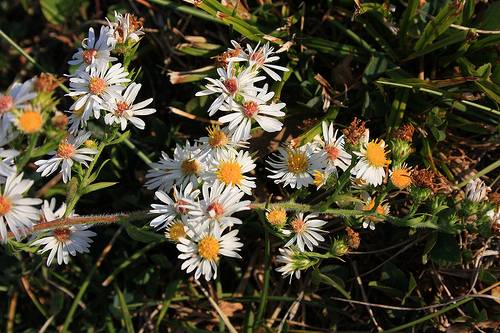
Frost aster, Aster pilosus.
(*photo
credit)
October 28, 2021 Finding Tax Havens Worse Than We Thought
Do vast tax havens exist? A decade ago, Tax Justice Network issued a report stating that the amount of assets that the world's super-rich hold in tax havens range from $21 to up to $32 Trillion. Since that time the total has most likely increased considerably. Information for these new estimates was taken from data available from the World Bank, International Monetary Fund, United Nations, and large banks. For all intents and purposes this is not necessarily tax evasion (illegal activities), but rather more legally fashioned tax avoidance -- but it ought to be illegal. The total avoided taxes could amount to a quarter of a trillion dollars yearly, money needed for cash-strapped governmental agencies. Donations to tax-exempt organizations could include tax avoidance, but the transferred assets most likely go to a good cause.
Is this piracy of the commons? The tax haven is more than a slight of hand trick; it is a willful disregard for responsibility to the nation(s) where the assets were generated and the owner dwells, and thus returnable to the commons from which it was taken. We regard financial resources as ultimately part of the commons, and so any act that channels this for private gain needs to be justified by the steward of wealth. But when the materials obtained either legally or otherwise are turned into an excessive power-based private and privileged advantage, then the equality and common good of the world community is damaged. White-collar piracy has resulted and this is a moral abuse of power.
Why the problem? Globalization, the power of accumulating wealth and easy transfer of wealth, allows the flow of financial resources across national boundaries to areas of low or no taxes and hidden or absent accountability. The tax haven is a place of far lower or zero restriction and where the money is stored or used in a controlling or irresponsible fashion by the "owner" who sequestered wealth and removed it from fair taxation. Mobility in resource-transfer allows such imbalances, and thus billions of tax dollars are avoided by clever possessors and financial advisors.
What is the solution? A global government enforcement agency ought to exist to regulate the flow of finances and put a halt to tax havens. If globalization is tolerated so much there be global controls for the sake of justice. The injustice of wealth accumulation and retention in such forms as tax havens could be directly challenged by a new UN watchdog agency. Transparency of those who frequent tax havens will open a global possibility of fair taxation. Controlled globalization is utterly necessary; the sooner the better. Yes, TAX HAVENS MUST BE ABOLISHED, and for the sake of social justice for the poor and for renewing our economic and social structures, it is critical at this time.
Prayer: Lord, give us the courage to address the super-wealthy privateers who take from the Commons and then are "legally" able to hide their ill-gotten goods in out-of-reach places.
Staying Upbeat during the Pandemic
How do we stay upbeat during these troubling times? It is not easy. The following are an accumulation of suggestions given in the media or from past experience:
Stay home and keep busy. This may take a variety of forms depending on the needs of the house. Working at home is better than doing nothing, and it takes our minds off of the pandemic's toll. You may want to remodel the place or rearrange furnishings.
Exercise in place. Many people desire to walk or work outdoors. We can get plenty of exercise through indoor devices or known exercises that do not require equipment. Some will still brave the outdoors minus gyms and other social places; others will connect with tv shows on how to perform yoga. Just stay active.
Practice Zoom in contacting others. Friends and loved ones hurt as much as you do. A Zoom meeting with another or with a group could be very beneficial for uplifting spirits. Some of us do not like to meet online, but encouraging a facile facilitator is most helpful. On the whole it is heartwarming to see faces of those we know.
Write some reflections. A major pandemic period hopefully will never come again. A future generation may like to know how you endured this episode. Consider writing for a future generation; it is well worth the effort.
Garden a little longer. It's time to prepare for frost season and winter. Developing a garden that has late fall and winter production involves placing a cover over hearty fall greens, root crops and brassicas. A light cotton cover will do in milder weather conditions that we have been experiencing here in Kentucky. Other forms of greenhouse or tent covers such as Remay cloth will suffice, as will layers of leaves and grass on certain crops, or retain root crops for a length in the soil.
Plant a tree. Remember that trees can be living remembrances of these pandemic times. It may be a fruit or even longer-lasting pecan, hickory or walnut tree. The planting may include others in the household or neighborhood, provided all take safety measures.
Observe wildlife. This is especially true with birds that flock together at this time or those who stay around through the winter. Bird feeding may be your forte; we have so disturbed the habitat of these creatures that our feeding efforts are one remedy and could be done with an ecological peace of mind.
Advertise in some fashion. This may be time to put out a humorous sign in the front yard, or to do a fall decoration with corn shucks and pumpkins, or add some of the autumn flowers to beautify the landscape at a small expense.
Give some added time for prayer. It is always beneficial to communicate with God during difficult times. We discover our own needs and seriously recognize a depressed condition. By talking it over with the Lord, we find the comfort of knowing we have a compassionate divine ear.
You may desire simply to rest a little more during this period, and so do not let these suggestions stand in the way.
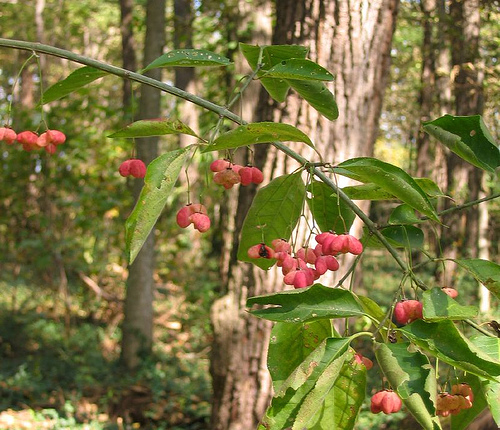
Eastern wahoo, Euonymus atropurpureus.
(*photo
credit)
October 29, 2021 Accepting God's Will in All Things
Naked I came from my mother's womb, naked I shall return.
YHWH gave, YHWH has taken back. Blessed be the name of YHWH!
(Job 1:21)
All life is a gift from God and we marvel that we are part of this. In receiving life, we graciously accept this gift of breath and a constantly beating heart. We know life is not due to our own undertaking, for we are naked at the beginning and will leave this mortal life in the same condition. What we have all the while is both a vital spirit of gratitude and an opportunity to create a new heart. Job gives us the words that are worth repeating so often in that limited span of time when we enjoy good times and endure bad ones, all as part of our mortal life.
Control freaks are sadly mistaken. We undoubtedly meet people who are supposedly in command of all aspects of their own lives: their family affairs, commercial transactions, plans for the year, and professional advancement. Then suddenly something happens and they are visibly shaken by the unexpected. One such Christmas letter of family achievement abruptly ended the year a son of a success-oriented family committed suicide. Foremost in the minds of those wanting control is how they can compensate and regain control. It's time to tell them in a non-condescending manner that God is in control, not us.
Accepting God's will appears at first to be an easy task, for words flow easily and most will not object. However, gladly accepting God's will can be difficult. Suddenly prayers seem hard to compose, and we wonder if anyone is listening. Amid desolation, light dawns; Easter is always empowering -- and it stands out in hope that in God we trust and in God we find refuge. The world fumbles about and is hesitant to surrender, for that seems to be a sign of weakness. Once opening, spiritual empowerment follows and we are more able to accept God's will.
God is in charge. To accept God's role is a lifetime's work, for only then do we begin to discover the first shadows of God's presence in our midst. Job discovered his place amid good and bad times; so ought we. Mishaps become opportunities for progress and thus, in seeing what these are, we discover the invitation to help establish the reign of God on this troubled Earth. Yes, God is totally in charge of the world around us, and we are the humble workers both individually and in community. We pray and strive to work with a renewed spirit; we replace pandemic woes with new resolve. We recommit ourselves to helping bring about a renewed economic and social order. We encourage others who need spiritual support at this critical time.
Prayer: Lord, teach us to find you in all things, and to reaffirm that you control our individual and collective destinies.

Fallen leaves of the sugar maple, Acer saccharum.
(*photo
credit)
October 30, 2021 Concluding October with Halloween
Sic Transit Gloria
Glory struts a moment, but like October passes on;
its fading is a fleeting night-traveler's dream,
like untried soldiers in battle parade.
Colorful glory passes as fast as green summer tones
changing before our eyes into fall's earthy rainbow:
red, yellow, crimson, and gold.
Fluttering leaves are a new season's venue,
heralding a foreboding naked-forested November
through clouds of Halloween ghosts and witches.
Halloween is tomorrow, but our celebration varies. Do we fear death as something spooky and filled with denial by frightened immature minds, or do we take a more balanced stance, a philosophical view that mortal life is transitory and only the love we generate has eternal value? Love lasts because it is godly and spiritual and far different from material values. Metals rust, garments become moth-eaten, wood rots, and middle age gives way to seniority. Only love endures. Foreboding has a reason: we have lost opportunities to love all the deeper, but know beyond the flutter of leaves to the ground that love lost can still be gained in the few remaining fleeting moments of life.
The saints are marching on. Today prepares us for tomorrow's All Saints Day. Today we look back to hidden depths and angst-laden missteps of yesteryear, but there is a movement we can barely detect, the marching of unnamed legions of saints in parade. Ghosts of the past and yet they are real today -- spooky ghosts or lively happy ones. We recall our acquaintances who have passed on. Their memories even when fading still give us courage, for we see that their glory of freshness of mortal life faded, but their loving acts remain. They give us courage, reminding us in their relatively short span on this planet of the shortness of our own.
Glory will return. With autumn fading, we look ahead to winter with its own glimmers of hope. Glory has passed, but we are still breathing. Like the good thief on the cross, we can still call out for help. We have a few moments left and we know the power of prayer sincerely muttered. We believe in that power, that firm commitment of a loving God. Faith in the Resurrection is renewed on this last day of October, for the pleasures of our past faded along with the missed opportunities. So be it! October fades with its passing color and that is natural. But the parade also has a spiritual flavor; and the parading promenade has a joyful ring that goes beyond ghosts and goblins. Two worlds of images clash and compete for our attention. Death and decay or an invitation to eternal light. Happy Halloween!
Prayer: Glory to you, Lord, and only you. October's natural glory passes, but allows us to see an invitation to eternal glory accentuated through loving deeds. Help us choose well.

Fresh pawpaw pie.
(*photo
credit)
October 31, 2021 Considering Mortality and Love of God
I look at you and think about things that never come to an end
because God has watched them and cannot forget them...
One night we will shut our eyes, the rest belongs to wind and foam
but love will live on. Leopoldo Panero
As we prepare to enter November and the Feast of All Saints, and then a day to remember the holy souls, we focus on our mortality. Some spiritual writers such as Jose I. Gonzalez Faus say that we ought to think about death daily, but in a peaceful manner. The combination of love of God (today's homily theme) and our own passing could be worthwhile, especially for all of us who struggle to love God with everything we have at our disposal. In fact, the challenge is to seek happiness that comes with being close to God, and the comfort of this overcomes an uneasiness associated with morbid thoughts of death, especially on Halloween.
Through today's readings we strive once more to balance love of God and love of neighbor. But these are not two inseparable components of our spiritual life; rather, we discover that they are part of an infinite ocean of Love. Even in the midst of a reflection on our mortality we discover peace, for we realize that we express love of God through love-filled service to neighbor; we love neighbor all the more as we seek to grow in love of God. Rather than this becoming a juggling act that never allows us to control the separate elements, we discover a oneness in love because God is love, and God inspires our loving deeds.
Having said this, we return to the uncomfortable thought of death. Perhaps, this is a struggle of reconciling ourselves, for we know that wisdom consists in knowing the shortness of our lives; with each passing loved one, that awareness becomes all the more vivid. But should it be disconcerting if we place dying in the context of love -- something eternal that will last way beyond the final date on our tombstone? If we reflect daily on our love of God, so ought we to see a goal up ahead where death is a passing and a birth to eternal life of love. The reflection gives us comfort and dissuades us from doing stupid things, because our goal of what lies ahead is too grand to be tarnished by imperfections.
Our reflection extends beyond our individual passing from this world, for we already enjoy communion with those holy ones who have passed on. This communion of saints draws us forward, a teleological magnetism attracting us to the beyond. Neighborly service is not restricted to the here and now, but extends to the out there and then. We are cautioned not to spend too much time speculating about the future. In a growing sense of mutual togetherness, we are able to think peacefully about our mortality on a daily basis -- the ever-closer hour of our death.
Prayer: Lord, give us the grace to love all the more deeply and to see this as an eternal love, an eternal NOW. |